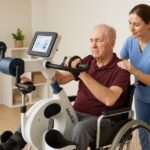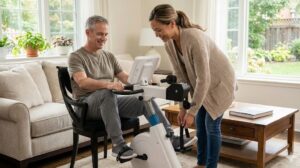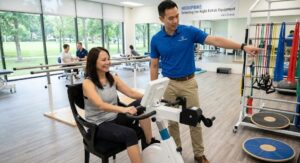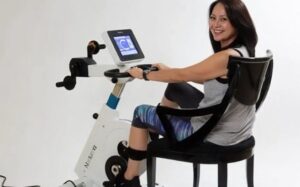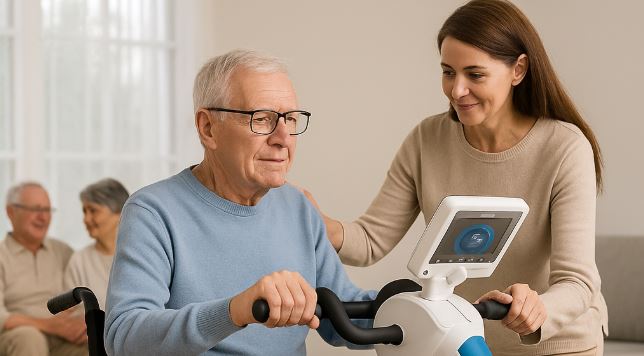
Adaptive cycling often begins as part of a rehabilitation plan, but its impact doesn’t stop there. Devices like the MedUp V2 are redefining what long-term mobility looks like—not just for patients, but for caregivers and community health programs as well. From structured therapy to home routines and group wellness sessions, adaptive cycling is helping people move more, feel better, and stay engaged.
From Therapy to Daily Habit
While many people first encounter adaptive cycling in clinical rehab settings, its real potential lies in day-to-day use. Whether at home, in a long-term care facility, or as part of a wellness program, the MedUp V2 offers consistency, control, and simplicity.
- Accessible and Portable: The MedUp V2 is designed to be user-friendly and mobile. It can be wheeled from room to room and operated in a variety of settings with minimal setup.
- Flexible Routines: Users can switch between passive, assisted, or active cycling, depending on energy levels and therapeutic goals.
- Built-In Progress Tracking: With real-time symmetry and performance stats, users and caregivers can monitor improvement and tailor future sessions.
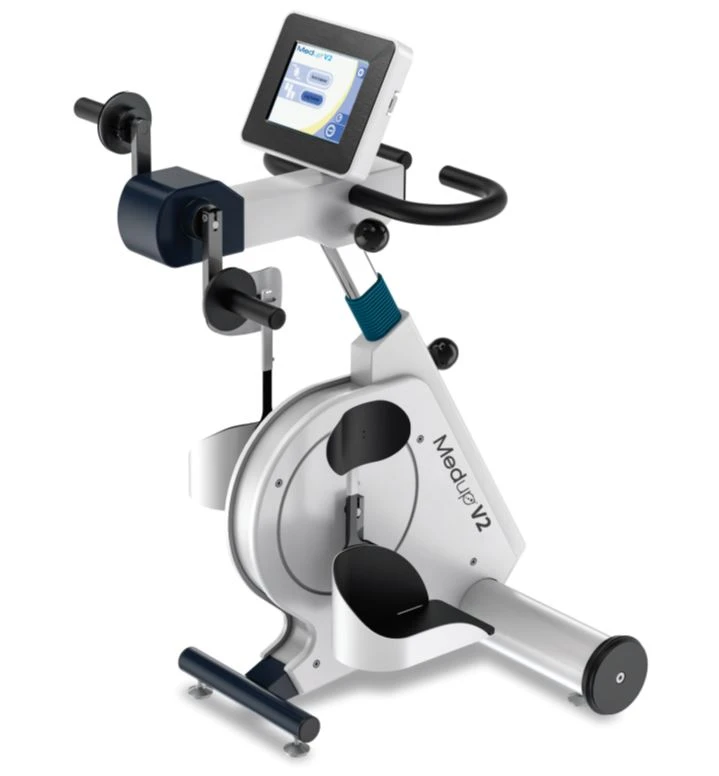
Support for Caregivers
Caregiving can be physically and emotionally demanding. The MedUp V2 helps reduce strain by creating low-effort, high-impact movement sessions that can be managed together.
- Safer Sessions: The passive and assisted modes enable movement without placing physical strain on the caregiver.
- Encourages Independence: Many users can manage their own sessions, including mode changes, once they’re familiar with the device.
- Structured Routine: Adding cycling to a daily or weekly schedule offers both structure and a shared activity that enhances connection.
Community Health and Group Wellness
The MedUp V2 also supports group-based movement programs in community centers, long-term care facilities, and rehab clinics. Used in shared settings, it encourages participation and makes physical activity a social event.
- Motivation Through Group Sessions: Group cycling encourages consistency and accountability while fostering a sense of belonging.
- Social and Cognitive Benefits: Regular sessions with peers can combat isolation, improve mental well-being, and keep users engaged.
- Customizable Feedback: Instructors and facilitators can adjust settings based on user data, ensuring personalized attention in a group format.
A Weekly Example: Cycling as Routine
- Short daily sessions (10–15 minutes) in passive or assisted mode help maintain circulation and reduce stiffness.
- Two longer sessions per week in active mode can build strength and cardiovascular health.
- Weekly group sessions foster connection and motivation while giving caregivers a structured break.
Practical Integration into Care Plans
The MedUp V2 fits seamlessly into a variety of settings:
- In-Home Care: Enables consistent, low-impact movement as part of morning or evening routines.
- Therapy Clinics: Acts as a bridge between one-on-one physical therapy and independent rehabilitation.
- Caregiving Schedules: Allows caregivers to facilitate movement safely and efficiently as part of overall care goals.
What to Expect Over Time
Users and caregivers report improvements in:
- Muscle tone and reduced stiffness
- Cardiovascular circulation
- Confidence and emotional well-being
- Overall care satisfaction
- Caregiver physical workload and burnout prevention
Learn More on MedUpBike.com
- For a detailed breakdown on using cycle therapy for spasticity, read: The Transformative Benefits of Cycle Therapy for Muscle Spasticity
- Interested in stroke recovery approaches? Visit: Best Ways to Support Mobility During Recovery from Stroke
Expert Perspective
The World Health Organization emphasizes how accessible physical activity contributes to mental health and community connection. Their report on Active Ageing and Community Wellness is a great place to explore the broader impact of movement programs like adaptive cycling.
Better Outcomes for Patients and Caregivers
The MedUp V2 isn’t just a rehab tool. It’s a long-term mobility solution designed to reduce barriers, support caregivers, and build a stronger sense of connection—physically, emotionally, and socially. Adaptive cycling supports daily living, not just clinical progress, and it’s changing how people think about aging, disability, and recovery.
Interested in bringing adaptive cycling into your care routine or community space? MedUp V2 can help you get started with the equipment, training, and planning support you need.

